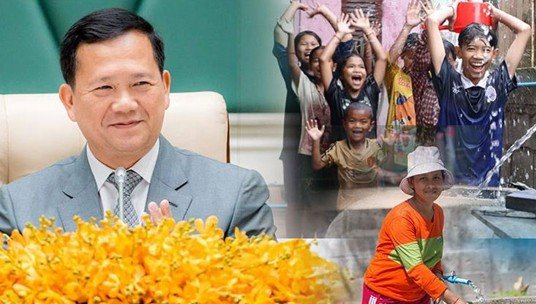Phnom Penh, Cambodia – The Cambodian government has pledged $60 million over the next three years to enhance clean water infrastructure in five provinces, responding to increasing demand amid rapid population growth.
Prime Minister Hun Manet announced the investment on February 17, emphasizing the government’s longstanding commitment to ensuring access to clean water across the country. He highlighted that water security has been a priority for multiple mandates, with continuous efforts to expand supply networks in both urban and rural areas.
“Providing clean water to the people is a fundamental responsibility of the Royal Government, and we will continue to invest in expanding access until the entire nation is covered,” Hun Manet stated on social media.
The new funding, allocated at the request of the Ministry of Industry, Science, Technology, and Innovation, will target improvements in five key provinces:
- Kampot Province – Kampot Water Authority
- Svay Rieng Province – Svay Rieng Water Authority
- Kampong Thom Province – Stung Sen City Water Authority
- Mondulkiri Province – Mondulkiri Water Authority
- Pursat Province – Pursat Water Authority
Expanding Access to Clean Water
Urban vs. Rural Disparity: While 85% of urban households have access to safe drinking water, only 70% of rural households benefit from the same, according to a 2024 report by the Ministry of Industry, Science, Technology, and Innovation. This initiative aims to narrow the gap by focusing on rural and newly urbanized areas.

- Climate and Infrastructure Challenges: The country’s water sector faces significant obstacles, including climate change-induced droughts and aging infrastructure in remote areas. The Cambodian government has committed to modernizing outdated systems and integrating climate-resilient water management strategies.
Cambodia’s water infrastructure has expanded significantly in recent years, yet demand continues to outpace supply, particularly in rural communities and newly developed urban outskirts. The government has increased investments in water production capacity to meet growing needs and aims to extend coverage nationwide in the coming years.
According to a 2024 report by the Ministry of Industry, Science, Technology, and Innovation, approximately 85% of urban households and 70% of rural households have access to safe drinking water. The new funding is expected to further bridge this gap, particularly benefiting communities with limited or no access to clean water sources.
Despite progress, Cambodia continues to face water challenges exacerbated by climate change, seasonal droughts, and infrastructure gaps in remote regions. International organizations, including the Asian Development Bank and the World Bank, have previously supported Cambodia’s clean water initiatives, underscoring the importance of sustainable water management.
The Royal Government has pledged to continue phased expansions of its water network, aiming for full nationwide coverage in the future. As Cambodia navigates its development trajectory, access to clean water remains a crucial element in improving public health and economic resilience.


